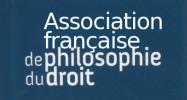Paper's abstract
Marie-Anne
Frison-Roche,
To Protect Human Beings, the Ethical Imperative of the Legal Concept of Person
It is through the law that the human being has acquired a unity in the West (I). What religion had been able to do so did the Law by tagging each human being with the notion of "person" which cannot be separated from him (I.A). But this is what is challenged today, not the personality and the power that the human being has to express his freedom but the unity that it implies in the disposition that we have of ourselves in repelling the desire that others have always had to dispose of us. Current law tends to "pulverize" human beings into data and to transform into neutral legal services what was considered before as the devouring of others. The legal concept of "consent", ceasing to be the proof of a free will but becoming an autonomous concept, would suffice (I.B.).
To ensure that the "law of desires" does not prevail, which merely reflects the adjustment of forces, we must demand here and now the ethical sovereignty of Law, because Law cannot be a mere technique to adjust interests (II). We must request this if we do not want to live in an a-moral universe (II.A), if we realize that the unity of the person is the legal invention that protects the weak human being (II.B.). If we admit this imperative, then we must finally ask who in the legal system will express and impose it, namely the Legislator or the Judge, because we seem to have lost the ability to recall this principle of the Person on which the West was so centered. But the principles that are no longer said disappear. There would then remain only the case-by-case adjustment of interests between human beings in the world of particular forces. At this yardstick, Law would be no more than a technique of securing particular adjustments. Law would be reduced at that and would have lost its link with Ethics. (II.C).
Key Words : GPA person humanity
t. 60, 2018: p. 363-378
